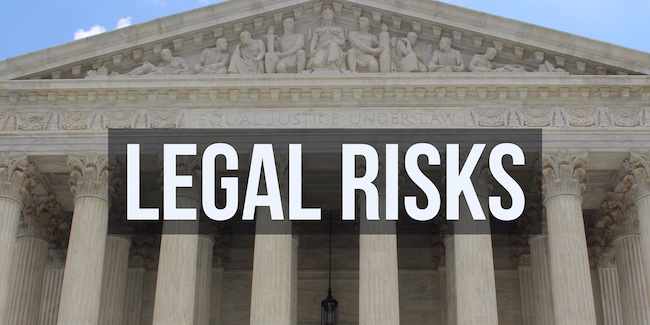Becoming a freelancer who works from home might sound like a dream come true, especially if you are stuck in a 9-to-5 job you hate.
Being a freelancer and working from home can be great. You can wear whatever you want and not have to worry about having a boss. But the reality is that there are also disadvantages to becoming a self-employed freelancer. For instance, it might feel like you have several bosses if you don’t have good boundaries set with your clients. In addition, there are some legal risks freelancers face that those who work at a standard 9-to-5 job don’t have to worry about.
If you are considering becoming a freelancer, here are 5 legal risks you need to know about.
Table of Contents
ToggleNon-payment issues
When you work hard for your client you expect to receive payment for what you provided. Unfortunately, some clients will do anything and everything they can to wiggle out of their financial obligation to you for the work you have done for them. Because you are providing a service instead of a product for them, it can be difficult to collect payment in these situations. Make sure you get a contract signed by your client that is clear about the service being provided and the payment you expect. In addition, check very carefully to make sure there are no errors or falsified information.
Also have a 3-5 percent penalty per month if you are not paid on time.
Confidentiality
Juggling multiple clients can be tricky, but it isn’t impossible. Something you need to watch out for when freelancing, however, is accidentally letting information about one client slip when dealing with another. No matter how innocent your intentions might be, you must be very careful about your dealings with your clients. It only takes a few words out of your mouth to find yourself tangled up in this legal nightmare.
Plagiarism
As a freelancer, you must take care not to plagiarize the work of other writers and freelancers. Conduct thorough research about your topic and cite sources properly. Mix in your own words and ideas. You can even use a service like Copyscape that checks for plagiarism so you can avoid it.
Defamation of character
The old saying that words can never hurt you is a lie. You must use caution in your wording when talking about other businesses or famous people to avoid a lawsuit for defamation of character. Do not make statements that slander or harm someone else and certainly do not make false statements or accusations.
Taxes
As we all know, paying taxes is unavoidable, and depending on the volume of work you are doing, you are probably paying quarterly self-employment taxes. What you pay every three months may seem steep, but it helps you in the long run when you file your tax return and send that final, somewhat smaller, check to the government.
If you aren’t paying taxes each quarter, you will have to ensure you have the full balance come tax time or you could end up owing additional amounts for penalties and late fees. To prevent this, hold a portion of your income out and bank it so you are able to pay the full balance of your taxes on time.
Additionally, make sure you keep good records so you can avoid legal ramifications.














